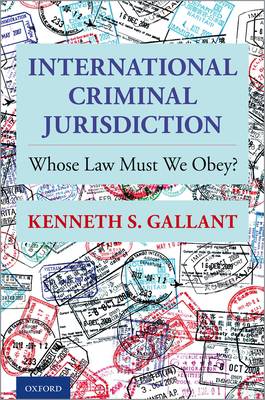
Bedankt voor het vertrouwen het afgelopen jaar! Om jou te bedanken bieden we GRATIS verzending (in België) aan op alles gedurende de hele maand januari.
- Afhalen na 1 uur in een winkel met voorraad
- In januari gratis thuislevering in België
- Ruim aanbod met 7 miljoen producten
Bedankt voor het vertrouwen het afgelopen jaar! Om jou te bedanken bieden we GRATIS verzending (in België) aan op alles gedurende de hele maand januari.
- Afhalen na 1 uur in een winkel met voorraad
- In januari gratis thuislevering in België
- Ruim aanbod met 7 miljoen producten
Zoeken
€ 290,45
+ 580 punten
Omschrijving
International Criminal Jurisdiction is a treatise for anyone conducting research into how domestic and international regimes create and enforce rules for personal and subject matter jurisdiction in transnational or international criminal cases. It is the only such treatise in English on this topic. Attorneys representing corporate executives in white collar criminal cases will be able to use this book to construct challenges to a foreign court's exercise of jurisdiction over those clients. Legal scholars wishing to critique foreign domestic courts for defying suppression treaties will find in this book information on how and why those courts are doing so. Law students will turn to this book for distinctions between international criminal tribunals and domestic courts in the exercise of personal jurisdiction over government officials. The book provides complete details on how domestic legislatures and the U.N. have created statutory and treaty-based rules expanding or even
limiting courts' and tribunals' jurisdiction over certain crimes and certain categories of defendants. This research serves the book's function as a thorough guide to jurisdictional questions that arise when criminal acts or criminals cross borders. Questions include whether a defendant possesses standing to challenge an international tribunal's personal jurisdiction over him, what happens when a given domestic regime neglects to criminalize conduct prohibited by a new treaty, and why some domestic courts choose not to exercise extraterritorial jurisdiction.
limiting courts' and tribunals' jurisdiction over certain crimes and certain categories of defendants. This research serves the book's function as a thorough guide to jurisdictional questions that arise when criminal acts or criminals cross borders. Questions include whether a defendant possesses standing to challenge an international tribunal's personal jurisdiction over him, what happens when a given domestic regime neglects to criminalize conduct prohibited by a new treaty, and why some domestic courts choose not to exercise extraterritorial jurisdiction.
Specificaties
Betrokkenen
- Auteur(s):
- Uitgeverij:
Inhoud
- Aantal bladzijden:
- 808
- Taal:
- Engels
Eigenschappen
- Productcode (EAN):
- 9780199941476
- Verschijningsdatum:
- 27/05/2022
- Uitvoering:
- Hardcover
- Formaat:
- Genaaid
- Afmetingen:
- 155 mm x 231 mm
- Gewicht:
- 1156 g

Alleen bij Standaard Boekhandel
+ 580 punten op je klantenkaart van Standaard Boekhandel
Beoordelingen
We publiceren alleen reviews die voldoen aan de voorwaarden voor reviews. Bekijk onze voorwaarden voor reviews.









